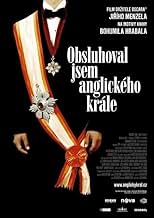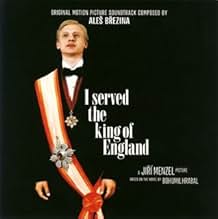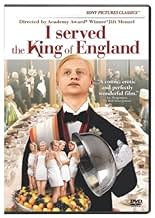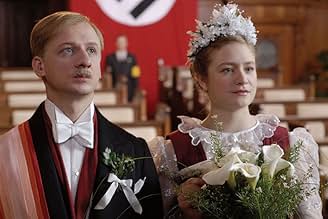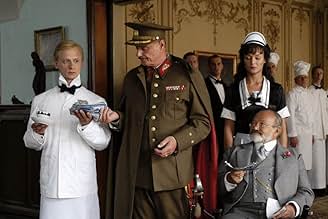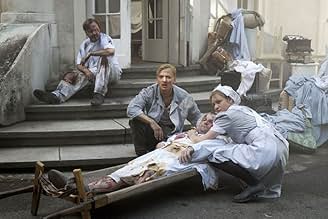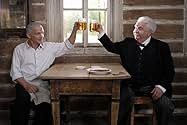NOTE IMDb
7,3/10
8,4 k
MA NOTE
Ajouter une intrigue dans votre langueA look at the glamorous life at an old-world Prague hotel.A look at the glamorous life at an old-world Prague hotel.A look at the glamorous life at an old-world Prague hotel.
- Réalisation
- Scénario
- Casting principal
- Récompenses
- 12 victoires et 13 nominations au total
Avis à la une
Obsluhoval jsem anglického krále (2006), written and directed by Jirí Menzel, is a Czech film shown in the U.S. with the title, "I Served the King of England." Menzel directed "Closely Watched Trains," one of the great movies of the 1960's.
Using flash forwards and flash backs, we follow the life of Jan Díte, played as a young man by Ivan Barnev, and as an older man by Oldrich Kaiser. Díte is obsessed with becoming a millionaire, and the younger Díte manages to accomplish this goal by his total unconcern for the plight of his country and his fellow Czechs.
When the Germans invade Sudetenland, and then the rest of Czechoslovakia, Díte takes it all in stride, calmly embracing--figuratively--the Nazi invaders and--literally--a lovely young Nazi woman. I think we are supposed to perceive him as naive and innocent, but my interpretation is that he is willfully ignorant and basically uncaring. My mother always said, "There are none so blind as those who will not see." That quote perfectly fits Díte's character.
The film has some comic moments, and the views of Prague are lovely. The movie is worth watching if the opportunity arises, but not worth strenuously seeking out. We saw it at the Rochester High Falls International Film Festival. It will work well on DVD.
Using flash forwards and flash backs, we follow the life of Jan Díte, played as a young man by Ivan Barnev, and as an older man by Oldrich Kaiser. Díte is obsessed with becoming a millionaire, and the younger Díte manages to accomplish this goal by his total unconcern for the plight of his country and his fellow Czechs.
When the Germans invade Sudetenland, and then the rest of Czechoslovakia, Díte takes it all in stride, calmly embracing--figuratively--the Nazi invaders and--literally--a lovely young Nazi woman. I think we are supposed to perceive him as naive and innocent, but my interpretation is that he is willfully ignorant and basically uncaring. My mother always said, "There are none so blind as those who will not see." That quote perfectly fits Díte's character.
The film has some comic moments, and the views of Prague are lovely. The movie is worth watching if the opportunity arises, but not worth strenuously seeking out. We saw it at the Rochester High Falls International Film Festival. It will work well on DVD.
Menzel's film is a modern masterpiece. It tells the story of one man's fate, as seen through the mythical pen of Bohumil Hrabal, one of the greatest Czech writers of the 20th century. The film is interspersed with documentary footage of the occupation of the remnants of the Czech republic in 1939. It tells how one man grows up in one system, survives another, and willingly submits himself to a third (Communist). The slogan "my happiness was always in the fact that some unhappiness overtook me" belongs to the East European theater of the absurd. For those of you who have seen the amazing performance of Julia Jentsch in "Sophie Scholl - The Last Days" it will come as a surprise, if not a shock, to see Ms. Jentsch play a character exactly opposite to the one which brought her such fame -- a true blue Nazi! But that's what great actors are made of -- anti-Nazi heroine this year, Nazi lover of the main protagonist the next. She learned some Czech for this role, but when she speaks in German, the screen shows Czech subtitles. Some scenes are really priceless, as when Dite is escorted out of his hotel (presumably in 1948), by two members of the Communist people's militia who at first are inclined to allow him to stay on as administrator of his now nationalized enterprise, but when he keeps insisting he is a millionaire and needs to be arrested, they willingly oblige. Irony stays with us through the film, starting with the opening scene when the elder Dite is released from a Communist jail in Prague and he explains: "I was sentenced to 15 years (for being a millionaire), but because of the amnesty, I only had to sit for 14 and 3/4."
Obsluhoval jsem anglického krále (Jiří Menzel, 2006, 2h00) is very hard a movie to write on. Obviously, Bohumil Hrabal squares things up with Czech history or nationalism. His main character, brilliantly set up by Jiří Menzel (let's remember "Trains closely watched" and "The Aventures of private Ivan Tchonkin") is a sort of naive though ambitious petty crook, almost reaching his aim transformed into an ideal (becoming a millionaire) until History catch him back, after February 1948.
An older man, though not broken, is opening the movie : Jan is freed after serving 15 years ("which, thanks to amnesty, became 14 years and 9 months") in state prison. We follow older Jan Dite in Sudentenland, now a desert since Germans were expelled after WWII. He remembers his rise - mainly through women, generally whores, caring with him because his charm et his sweetness and invention in bed. This is the center of numerous flash-backs making the bigger part of the film. Nothing wrong to say about musical score, special effects (delicate and charming), casting (all women are beautiful), acting, filming and editing. Everything works, no flaws.
The problem, if there is a problem, lies in the hero and almost all of the characters he is mixed with : all are of a rather repulsively vulgar cynicism, which becomes the philosophy Jan uses to transform his first poor dream into an ideal. And those who are not of this kind are lead by nationalism - narrow minded (the Czechs) or hideous (the Nazi school-mistress Jan falls for). Oddly enough, the only one redeemed for us is the head waiter in Hotel Paris, who is Czech, righteous and courageous. Is it to tone down Hrabal's thesis?
So the whole story looks like an enormous bitter (and sophisticated) farce Menzel filmed on behalf of Hrabal's feelings.
Besides, there is still something in the movie, which make its vision not one-sided : a bitter-sweet taste given by the face of mature if not old men in front of women beauty, and the visible and overwhelming nostalgia this beauty vivify in their mind. They remember, and they smile... Isn't it there some kind of a sketch, the sketch of a how-to-grow-old handbook?
An older man, though not broken, is opening the movie : Jan is freed after serving 15 years ("which, thanks to amnesty, became 14 years and 9 months") in state prison. We follow older Jan Dite in Sudentenland, now a desert since Germans were expelled after WWII. He remembers his rise - mainly through women, generally whores, caring with him because his charm et his sweetness and invention in bed. This is the center of numerous flash-backs making the bigger part of the film. Nothing wrong to say about musical score, special effects (delicate and charming), casting (all women are beautiful), acting, filming and editing. Everything works, no flaws.
The problem, if there is a problem, lies in the hero and almost all of the characters he is mixed with : all are of a rather repulsively vulgar cynicism, which becomes the philosophy Jan uses to transform his first poor dream into an ideal. And those who are not of this kind are lead by nationalism - narrow minded (the Czechs) or hideous (the Nazi school-mistress Jan falls for). Oddly enough, the only one redeemed for us is the head waiter in Hotel Paris, who is Czech, righteous and courageous. Is it to tone down Hrabal's thesis?
So the whole story looks like an enormous bitter (and sophisticated) farce Menzel filmed on behalf of Hrabal's feelings.
Besides, there is still something in the movie, which make its vision not one-sided : a bitter-sweet taste given by the face of mature if not old men in front of women beauty, and the visible and overwhelming nostalgia this beauty vivify in their mind. They remember, and they smile... Isn't it there some kind of a sketch, the sketch of a how-to-grow-old handbook?
I got a bit of a shock when I saw this film. It doesn't seem to follow the rules of contemporary film-making--in other words, women aren't shown as fully equal to men (although they can be very resourceful in dealing with petty tyranny) and the hero shows no sign of resentment for the way he is treated. I felt a lot closer to the great works of the heyday of classic film by Cukor, Ophuls and Lubitsch. The story unfolds calmly and logically, whether the events take place in the 30's, 40's or 50's of the last century. Ivan Barnev as the young Jan is superb: funny, roguish and balletic (just watch how gracefully he swoops around the restaurant with that heavy tray; wonder how much rehearsal time that needed.) Jiri Menzel made Closely Watched Trains, then saw his career go into eclipse after the Soviet invasion in 1968. The work he has done since hasn't come to my attention until now. This may be his swan-song, since he is 70 now, but I hope not.
this is a farce in part, but i do wonder why there's the great American need to qualify this movie. so one will know the correct response, perhaps? aw, just sit back and be enlightened. if more folks had laughed at the Nazis they wouldn't have made it into power. and as for the woman being portrayed as lesser than the man, this is called history, folks. the movie is charming. barney is a mime's delight. and the sex is delicious, and certainly not raunchy as one reviewer on the DVD writes. i always find it stimulating to have to curb my love of MTV editing and car chases and to let the different pace of the European style wash over me. ah tempora, ah mores.
Le saviez-vous
- AnecdotesThe scenes for the Hotel Pariz restaurant were filmed in the main restaurant in Prague's Obecni Dum (Civic House), just around the corner from the actual Hotel Pariz. Both restaurants were designed in the Art Nouveau style by artist Alphons Mucha, but the Obecni Dum restaurant is larger.
- GaffesJan sees a train full of people being deported to a concentration camp. A closeup of one of the cars shows men within wearing gray and white striped uniforms. However, deportees were sent to the camps wearing their civilian clothes and weren't issued uniforms until after they arrived.
- Citations
Jan Díte, older: A person becomes most human, often against his own will, when he begins to founder, when he is derailed and deprived of order.
- ConnexionsEdited into CzechMate: In Search of Jirí Menzel (2018)
Meilleurs choix
Connectez-vous pour évaluer et suivre la liste de favoris afin de recevoir des recommandations personnalisées
- How long is I Served the King of England?Alimenté par Alexa
Détails
- Date de sortie
- Pays d’origine
- Sites officiels
- Langues
- Aussi connu sous le nom de
- I Served the King of England
- Lieux de tournage
- Sociétés de production
- Voir plus de crédits d'entreprise sur IMDbPro
Box-office
- Budget
- 84 450 000 CZK (estimé)
- Montant brut aux États-Unis et au Canada
- 617 403 $US
- Week-end de sortie aux États-Unis et au Canada
- 53 218 $US
- 31 août 2008
- Montant brut mondial
- 7 354 478 $US
- Durée1 heure 53 minutes
- Couleur
- Mixage
- Rapport de forme
- 1.85 : 1
Contribuer à cette page
Suggérer une modification ou ajouter du contenu manquant

Lacune principale
By what name was Moi qui ai servi le roi d'Angleterre (2006) officially released in Canada in English?
Répondre

